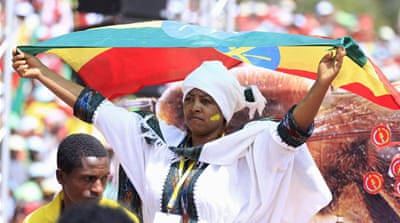Polls have opened in Ethiopia for the first general election since the death of Prime Minister Meles Zenawi, whose successor Hailemariam Desalegn is certain to stay in office.
Over 36.8 million Ethiopians have registered for Sunday’s polls that analysts say falls far short of open competition.
Western observers were not invited and the opposition alleges the government has used authoritarian tactics to ensure a poll victory.
“Electoral defeat is not on the cards for Ethiopia’s ruling party, but it is vital for the country’s development that it engages more effectively with dissenting voices,” said Jason Mosley, from Britain’s Chatham House think tank.
Posters of the ruling Ethiopian People’s Revolutionary Democratic Front (EPRDF) dominate the capital Addis Ababa.
The EPRDF has been in power for over two decades and is confident of a win, but insists the result will be decided on its economic record alone.
Ethiopia is now one of Africa’s top performing economies and a magnet for foreign investment.
Rights groups – which routinely accuse Ethiopia of clamping down on opposition supporters and journalists, and of using anti-terrorism laws to silence dissent and jail critics – said on Saturday that the polls would not be free or fair due to a lack of freedom of speech.
Addis Ababa dismisses such criticism, with government spokesman Redwan Hussein telling the AFP news agency that voters would choose their representatives based on performance.
“If they want to give us another chance they will vote for us,” he said. “If they have a grudge, they will not give their vote to EPRDF.”
Polls opened at 6:00am (03:00 GMT) on Sunday and will close at 6:00pm (15:00 GMT), with initial results expected within two to five days, and final official tallies on June 22.
Ethiopia, whose 1984 famine triggered a major global fundraising effort, has experienced annual economic growth of more than 10 percent over the last five years, according to the World Bank.
Former Marxist rebel-turned-leader Meles, who died in 2012, was succeeded by Prime Minister Hailemariam, who has said he is committed to opening up the country’s political system to allow more space for opposition parties.
‘Exceptional’ democracy?
The opposition accuses the government of using authoritarian tactics to ensure a poll victory.
“The political space has been closed,” said Yilekal Getinet, leader of Semayawi – the “Blue Party” in Ethiopia’s Amharic language, and one of the nation’s main opposition parties.
Such complaints are dismissed as “baseless” by the National Election Board of Ethiopia (NEBE).
“The environment created for political parties this year is exceptional,” NEBE president Merga Bekana said.
The Election Commission will deploy some 40,000 observers at 45,795 polling stations.
The only foreign election observers are from the African Union, which has sent a team of 59 officials. The European Union and the US-based Carter Center, which monitored 2005 and 2010 elections, were not invited back this time.
“While symbolically significant… the polls are more of a logistical hurdle for the ruling party than a competitive, democratic exercise,” Mosley said.
The ruling EPRDF won 2010 elections in a landslide. Those polls were peaceful, in contrast with 2005, when opposition accusations of irregularities sparked violence that left 200 people dead.
The opposition won 172 seats in that vote, but only one in 2010.
This time, that solitary incumbent opposition MP has chosen not to run again.
Meanwhile, polls in the constituency of the single independent legislator seeking reelection were postponed on Friday, after he complained there had not been “enough time and space” for campaigning.
Source: AFP






























